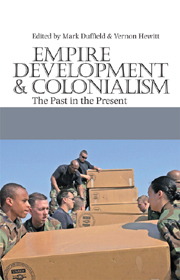Book contents
- Frontmatter
- Contents
- Acknowledgements
- Notes on Contributors
- Introduction
- 1 The Exceptional inclusion of ‘Savages’ & ‘Barbarians’
- 2 Empire, International Development & the Concept of Good Government
- 3 Empire: a Question of Hearts?
- 4 ‘Conflict-Sensitive’ Aid & Making liberal Peace
- 5 Development, Poverty & Famines
- 6 Plain Tales from the Reconstruction Site
- 7 The International Politics of Social Transformation
- 8 Liberal Interventionism & the Fragile State
- 9 Freedom, Fear & NGOs
- 10 Theorising Continuities between Empire & Development
- 11 Spatial Practices & Imaginaries
- 12 Decolonising the Borders in Sudan
- 13 ‘Individualism is, Indeed, Running Riot’
- Index
7 - The International Politics of Social Transformation
Trusteeship & Intervention in Historical Perspective
Published online by Cambridge University Press: 05 February 2013
- Frontmatter
- Contents
- Acknowledgements
- Notes on Contributors
- Introduction
- 1 The Exceptional inclusion of ‘Savages’ & ‘Barbarians’
- 2 Empire, International Development & the Concept of Good Government
- 3 Empire: a Question of Hearts?
- 4 ‘Conflict-Sensitive’ Aid & Making liberal Peace
- 5 Development, Poverty & Famines
- 6 Plain Tales from the Reconstruction Site
- 7 The International Politics of Social Transformation
- 8 Liberal Interventionism & the Fragile State
- 9 Freedom, Fear & NGOs
- 10 Theorising Continuities between Empire & Development
- 11 Spatial Practices & Imaginaries
- 12 Decolonising the Borders in Sudan
- 13 ‘Individualism is, Indeed, Running Riot’
- Index
Summary
Introduction
The premise of this chapter is that colonialism was always in part about social transformation. Despite the tendency in recent history and social science writing to play down the idea of the ‘mission civilisatrice’ (for fairly obvious ideological reasons), its plausibility is prompted by a number of considerations. Firstly the ending of the slave trade and the relative failure of ‘legitimate commerce’ provided the setting for the colonial experiment. Very crudely thinking about these matters was shaped by understandings of ‘civilisations’ and the absence of such in an Africa characterised by petty despotisms and endemic (quasi-criminal) conflict that was unable to sustain the minimum requirements of order and commerce, including the ‘internal’ order needed to finish off the slave trade. The pervasive sentiments of superiority, however repulsive to modern liberal ears (in part because of their not infrequent racial gloss), are understandable in the historical context (extreme technological disparities between African and European societies, widespread pseudo-Darwinian assumptions, etc.) and it is implausible to see them as (mere) rationalisations of conquest (Klein 1999; Colley 1994), or, in more recent vein, that the reproduction of ‘difference’ was a form of oppression of the ‘other’ (Said 1978; Todorov 1993). This obscures the very strong assertions of the universality of human nature throughout the modern period, even with regard to Africa, tempered, of course, by all sorts of quasi-evolutionary assumptions (Bell 2006).
Secondly, there are the remarkable parallels between colonialism as a civilising mission and a domestic strategy focused on the discipline of mass populations within the framework of the nation-state; the contemptuous rhetoric directed towards the domestic masses at the least rivalled that directed at colonial natives.
- Type
- Chapter
- Information
- Empire, Development and ColonialismThe Past in the Present, pp. 102 - 115Publisher: Boydell & BrewerPrint publication year: 2009



